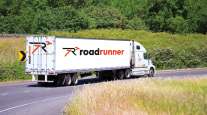Senior Reporter
Roadrunner Continues to Struggle in Aftermath of Federal Charges

Roadrunner Transportation Systems Inc. reported a fourth-quarter loss of $58.4 million, or $1.52 a share, compared with a loss of $23.3 million, or 61 cents per share in 2017. The Downers Grove, Ill.-based truckload and less-than-truckload carrier continues to struggle financially in the wake of an accounting scandal and the departure of several key executives, and at a time when business conditions in the freight industry remain strong.

The company said a corporate restructuring and restatement costs of $6.7 million, along with fleet impairment charges in intermodal services and a contingent purchase obligation adjustment, were responsible for the loss.
Roadrunner’s fourth-quarter revenue was $551.5 million, down 1.6% from 2017 when the company generated $560.4 million. For the year, Roadrunner lost $165.6 million compared with $91.2 million in 2017.
Despite the declines, CEO Curt Stoelting said the company is making positive strides.
“Overall, we made good progress in 2018 on a number of fronts. Operationally, over two-thirds of our businesses are now stable and growing,” he said. “Ascent Global Logistics and Active On-Demand have led the way, followed by our temperature-controlled, intermodal services and flatbed businesses, all of which achieved improved stability in 2018 and are positioned for growth in 2019. We are disappointed in the short-term performance of our dry van truckload fleets and are actively developing plans to streamline these businesses.”

Stoelting
Revenue for Ascent was up 12.6% for the quarter, while the truckload and express services and LTL segments slumped. The company said the truckload and express revenue declines resulted primarily from lower air and ground expedite brokerage at Active. Revenue declines in its LTL sector were a result of planned reductions in service areas and pricing discipline.
Roadrunner ranks No. 16 on the Transport Topics Top 100 list of the largest for-hire carriers in North America.
Last June, former finance executives Mark Wogsland and Bret Naggs were charged with multiple counts of conspiracy and wire and securities fraud in a scheme that the U.S. Department of Justice said led to a loss of $245 million in shareholder value.
RELATED: Former Roadrunner executives indicted for securities fraud
On March 13 Roadrunner announced a one-for-25 reverse split of the company’s issued and outstanding shares of common stock.
When the reverse stock split becomes effective in early April, every 25 shares of Roadrunner’s issued and outstanding common stock will automatically be converted into one share of common stock. No fractional shares will be issued. Roadrunner will continue to trade on the New York Stock Exchange under the symbol “RRTS” but will trade under a new CUSIP, the nine-digit, alphanumeric numbers that are used to identify securities, including municipal bonds.
Earlier this year, the company announced a plan to re-capitalize its business and offered shareholders until March 1 the option of buying more stock — 900 million shares were offered— at 50 cents a share.

Nearly all proceeds from this stock — $450 million — were to go to redeem preferred stock held by Elliott Management Corp., an investment firm that owns about 9.6% of the 38.5 million shares of Roadrunner’s currently outstanding common stock. At least $30 million of the net proceeds would be retained by the company for general corporate purposes, along with $15 million in transaction fees.
Under terms of the rights offering, Elliott has pledged to buy all of the newly issued shares, if necessary, to ensure that the rights offering is completed. In this scenario, Elliott would become the de facto owner of Roadrunner.
Staff Writer Daniel P. Bearth contributed to this article.




